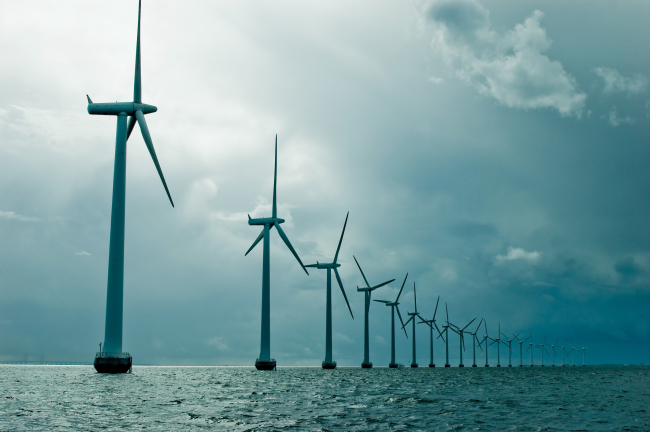The United Kingdom is committed to simultaneously spurring national economic development and cutting greenhouse gas emissions, ensuring clean growth and the supply of affordable energy for businesses and consumers, according to the UK Embassy in Seoul.
At the same time, it added that it was seeking to elicit international collaboration.
“Achieving clean growth, while ensuring an affordable energy supply for businesses and consumers, is at the heart of the UK’s Industrial Strategy,” the embassy referred to the policy paper “Clean Growth Strategy,” issued by the Department of Business, Energy and Industrial Strategy.
“It will increase our productivity, create good jobs, boost earning power for people right across the country, and help protect the climate and environment upon which we and future generations depend.”
 |
An offshore wind farm in Britain (Shutterstock) |
The British government was one of the first in the world to recognize and act on the economic and security threats of climate change, the paper said, adding that the Climate Change Act, passed in 2008, has committed the country to reduce greenhouse gas emissions by at least 80 percent by 2050, compared to 1990 levels, through a process of setting five-year caps on greenhouse gas emissions, termed “carbon budgets.”
The approach has now been used as a model for action across the world, and is mirrored by the United Nations’ Paris Agreement.
The UK has cut emissions by 42 percent from 1990 levels, while growing its economy by two-thirds -- a rate faster than any other G-7 nation. Last year, some 47 percent of electricity in Britain came from low carbon sources, and the country now has the largest offshore wind capacity in the world.
“Our homes and commercial buildings have become more efficient in the way they use energy which helps to reduce emissions and also cut energy bills,” the report said. “Automotive engine technology has helped drive down emissions per kilometer driven by up to 16 percent, and driving a new car bought in 2015 will save car owners up to 200 pounds ($270) on their annual fuel bill, compared to a car bought new in 2000. England also recycles nearly 4 times more than it did in 2000.”
The progress has been aided by the falling costs of many low carbon technologies: Renewable power sources like solar and wind are comparable in cost to coal and gas in many countries; energy efficient light bulbs are over 80 percent cheaper today than in 2010; and the costs for electric vehicle battery packs have fallen by over 70 percent since 2010.
“As a result of this technological innovation, new high value jobs, industries and companies have been created. And this is driving a new, technologically innovative, high growth and high value ‘low carbon’ sector of the UK economy,” according to the paper.
“Not only are we rapidly decarbonizing parts of the domestic economy, but thanks to our world leading expertise in technologies such as offshore wind, power electronics for low carbon vehicles and electric motors, and global leadership in green finance, we are successfully exporting goods and services around the world.”
The progress has altered the way people see many of the trade-offs between investing in low carbon technologies and incurring costs today, it added. “It is clear that actions to cut our emissions can be a win-win: cutting consumer bills, driving economic growth, creating high value jobs and helping to improve our quality of life.”
Stressing that greenhouse gas emissions are a global problem and it requires global action, the paper said the UK is playing a key role in tackling climate change worldwide through its domestic action, climate diplomacy and financial support.
By Joel Lee (
joel@heraldcorp.com)







![[Today’s K-pop] Blackpink’s Jennie, Lisa invited to Coachella as solo acts](http://res.heraldm.com/phpwas/restmb_idxmake.php?idx=644&simg=/content/image/2024/11/21/20241121050099_0.jpg)
